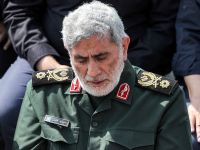All of a sudden, frontline commanders in Tripoli began to fall. One by one, they surrendered to the army intelligence. The deal, conducted in stages, was announced in a theatrical manner. But will they be released soon and will the blood of their victims have been shed in vain?
Security forces reached a compromise with frontline commanders in Bab al-Tabbaneh, where they would surrender voluntarily, in return for a short stay in prison. The deal got underway with the commander of al-Baddawi neighborhood, Omar Ibrahim aka Amer Arish, turning himself in to the army intelligence three weeks ago.
Ibrahim is suspected of having been involved in two major cases, the attack on Minister Faisal Karami's convoy and the formation of an armed terrorist gang. This is in addition to being an accomplice to several incidents of kidnapping, extortion, and setting fuel tanks on fire on their way to and from Syria.
However, his interrogation has almost come to an end. Ibrahim was quickly transferred to al-Qubbah prison, under orders from a senior officer. At the same time, Minister Karami dropped his personal charges against him and is working on closing the case permanently. Information also suggested that the accusations of terrorism and forming an armed gang against the Baddawi commander will be put under wraps in preparation for his release soon.
The rest of the commanders followed suit under the guarantees of the deal. According to information obtained by Al-Akhbar. Saad al-Masri, Ziad al-Saleh (aka Ziad Allouka), Khaled al-Qawwas, Omar al-Mheish, Hassan Srour, and Ali Sharkas turned themselves in on May 7. They were followed by the son of Baal al-Darawish a neighborhood commander, Mohammed al-Hilweh, aka Abu Daas, and a third suspect called Ahmed al-Abboud, who also surrendered to military intelligence.
The money is from [Justice Minister] Rifi and the weapons from Amid Hammoud according to the sources, "they are all in the pocket," meaning they are under control. The only thing that sets them apart is the magnitude of their involvement and their actions in the incidents witnessed by Tripoli recently.
However, there is an even more dangerous group, according to security sources. They are led by Osama Mansour, aka Abu Omar, and and the group includes Mahmoud al-Nuhaili (Abu Jamal), Mahmoud al-Hallaq, Khaled al-Rai, and Shadi al-Mawlawi, who are still at large.
The sources maintain that the deal was set in advance, especially since the subpoenas did not include Future Movement official and retired colonel, Amid Hammoud. He was not even summoned for questioning about some of the security incidents in which his name was mentioned. Following the explosion of the arms warehouse in Abu Samra in February 2012, rumors went around that Hammoud was involved in the incident.
In this regard, sources claim that several of those detained at the Information Branch of the Internal Security Forces (ISF) replied to the question about the source of the money and arms which they had received. "The money is from [Justice Minister] Rifi and the weapons from Amid Hammoud," they indicated. The same information was given by another commander, Hatem Janzarli, who was detained by the army at an earlier date. In his testimony, he said he had received money from Rifi, in addition to Sheikh Salem al-Rafai.
On the other hand, the sources described a meeting held at Minister Rifi's home, attended by one of the most prominent suspects, Faisal al-Aswad, in addition to Tripoli municipality member Khaled Soboh, Sheikh Kamal al-Bustani, and others. The meeting discussed the fate of the suspects and Rifi replied, "they are our sons and we will not leave them no matter what happens."
Thus, Tripoli is turning the page on the frontline commanders, albeit temporarily. However, the decision to put an end to this show was and still remains in the hands of the security forces. They are using the suspects as a card that can be used at any time. On the other hand, it is as if they are telling them: "Congratulations on your efforts. You can stop now. But keep your fingers on the trigger in case we need you."
The news came as a positive shock to Tripoli. It was shared by the city's residents, who felt relieved, and the remaining suspects, who are still on the loose. The surrender of the major commanders meant that those who are left are less significant and could either turn themselves in or remain fugitives.
"Turning the page on the clashes and fugitives in Tripoli in this manner only needed a political decision," political sources told Al-Akhbar. "Had this decision been taken from the start, it would have saved the city the tragedies and human and material losses incurred during over five years. This proves that the slogans previously raised to maintain the tense security situation in the city were empty words.”
An Islamist source commented on the issue by saying, "these commanders are merely a bridge to be crossed to start arresting Islamist suspects, who are known by name and are wanted dead or alive."
In the meantime, intelligence agents arrested Ali Mostafa Ramadan (aka al-Range), a frontline commander in Jabal Mohsen. The government's commissioner at the military court, Judge Sakr Sakr, charged 10 people from Bab al-Tabbaneh, including five detainees who were involved in recent incidents in Tripoli. He referred them to First Military Investigative Judge Riad Abu Ghaida.








